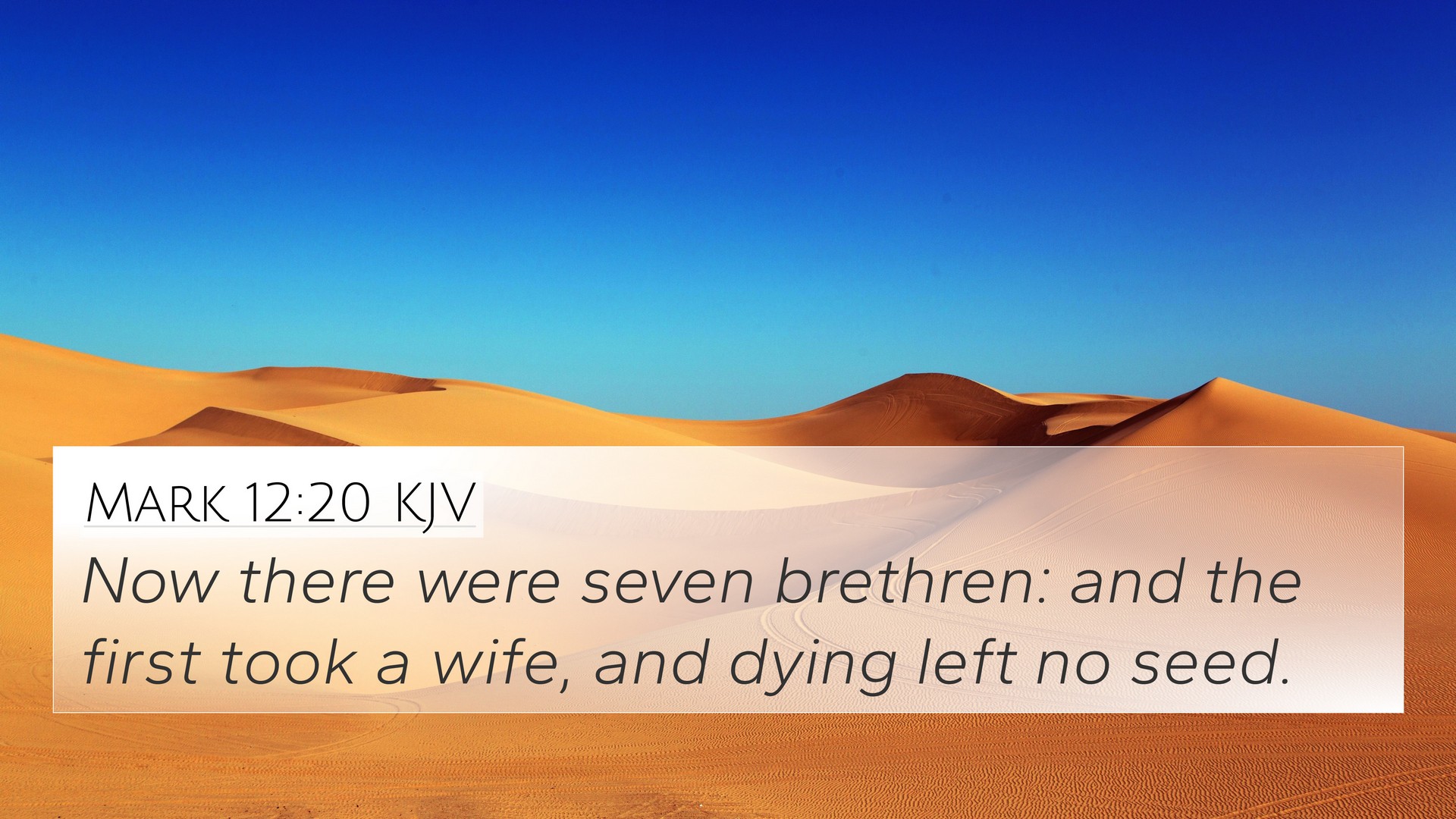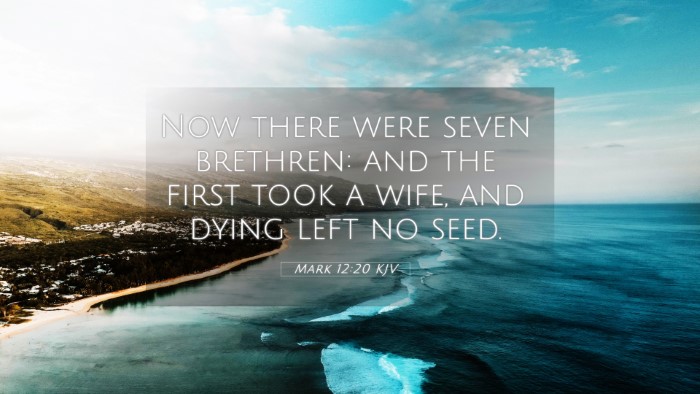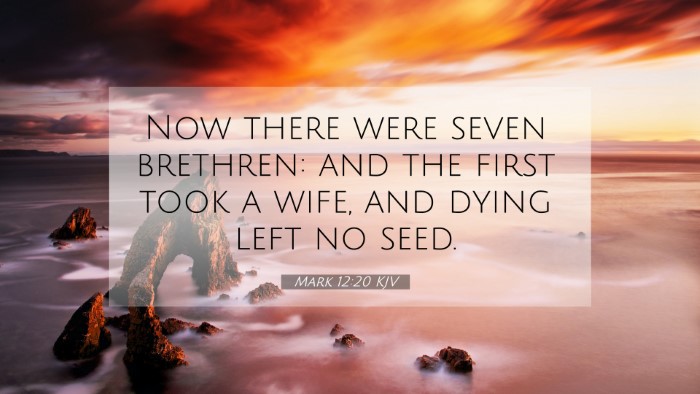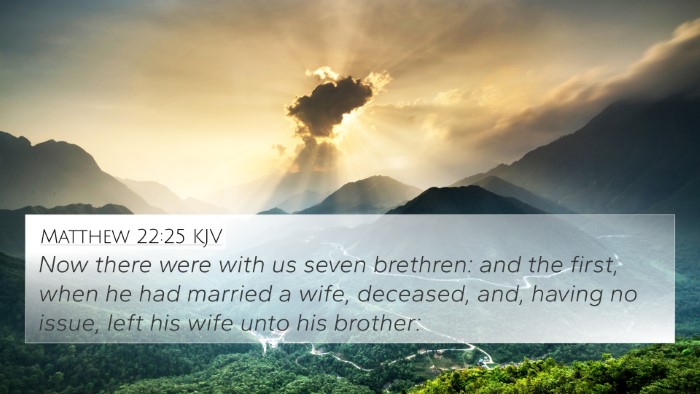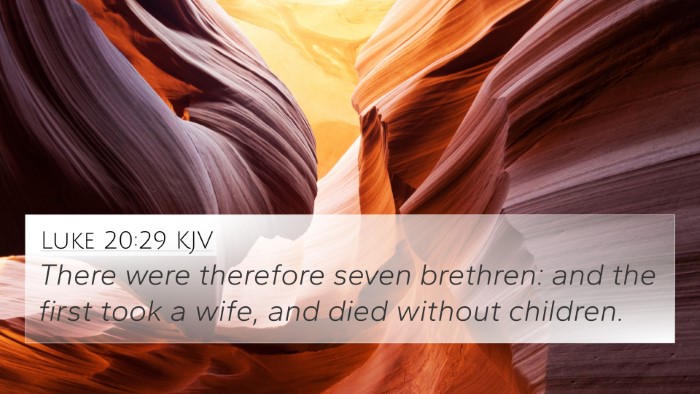Understanding Mark 12:20
Mark 12:20 references a scenario presented to Jesus concerning the resurrection and the law of Moses about the Levirate Marriage. This verse highlights the complexities of theological discussions with the Sadducees, who denied the resurrection. The interpretation involves recognizing the deeper truths of scripture and the nature of God's promises.
Verse Content
Mark 12:20 (KJV): "Now there were seven brethren: and the first took a wife, and dying left no seed."
Commentary Insights
-
Matthew Henry's Commentary:
Henry discusses the Sadducees' challenge to Jesus about the resurrection state. They present a hypothetical scenario involving seven brothers, known as the Levirate law, where a widow must marry her deceased husband's brother to preserve his lineage. He notes this highlights their misunderstanding of both the law and the power of God.
-
Albert Barnes' Notes:
Barnes elaborates on the context of the resurrection and the Sadducees’ views that deny it. He points out that their question aimed to trap Jesus in logical fallacies regarding the resurrection, demonstrating their lack of comprehension about eternal life and the divine existence beyond earthly limitations.
-
Adam Clarke's Commentary:
Clarke emphasizes the cultural implications of the Levirate marriage law and its relevance to the Jewish audience. He suggests that the Sadducees viewed this law as a means of presenting their argument against the resurrection, assuming that earthly relationships would continue in the same manner, which Clarke asserts is a fundamental misrepresentation of the afterlife.
Cross-References in Mark 12:20
Mark 12:20 connects with various other scriptures, which help illuminate its meaning:
- Deuteronomy 25:5-6: This passage lays the foundation for the Levirate marriage laws that the Sadducees are referencing.
- Matthew 22:24: Similar account of the Sadducees questioning Jesus about the resurrection.
- Luke 20:29-32: A parallel passage that also discusses the same hypothetical situation presented by the Sadducees.
- Acts 23:8: A distinction between the Sadducees and Pharisees concerning their beliefs about the resurrection.
- John 11:25-26: Jesus affirms the resurrection and eternal life, contrasting with the Sadducees' doubts.
- Romans 6:5: Paul connects our union with Christ in His death and resurrection, affirming the hope in eternal life.
- 1 Corinthians 15:12-22: Paul elaborates on the importance of the resurrection in Christian faith.
- Revelation 21:4: A promise of eternal life and the absence of death in the kingdom of God.
Contextual Analysis
Theological discussions in the Gospels often reflect the broader conflict between Jesus and the religious authorities of the time. The Sadducees, being a wealthy and influential sect, often challenged Jesus' teachings that threatened their positions. In this instance, their approach to presenting theological questions encapsulates a misunderstanding of divine truths aimed at trapping Him.
Thematic Connections
Mark 12:20, along with other passages, illustrates several interwoven themes:
- The Reality of the Resurrection: Foundational in Christian belief, seen throughout the New Testament.
- The Nature of Divine Law: Exploring how God's laws relate to His character and promises.
- Human Relationships and Eternity: Teaching on how earthly bonds are transformed in the resurrection life.
- Faith vs. Logical Fallacies: Jesus counters the use of logic devoid of faith and divine understanding.
Conclusion
Mark 12:20 invites deep reflection on the nature of resurrection and eternal life. By cross-referencing this scripture with others, we uncover rich theological implications. The insights from reputable public domain commentaries convey the depth of meaning embedded in this verse, emphasizing the importance of understanding Jewish law, the resurrection, and God's promises. The study of cross-references allows believers to connect various scriptures, enhancing our grasp of Biblical teachings.
